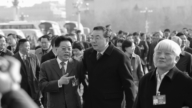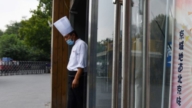【新唐人2011年5月11日讯】前不久,《法国国际广播电台》对中国6244亿元的的天价“维稳费”进行报导,招来了中共媒体《新华网》的猛烈攻击,并声称中国只有“公共安全支出”,没有“维稳费”。不过,大陆媒体《财经》杂志,最近又把中共的公共安全账单晒了出来,间接证实了《法广》的报导。
《财经》杂志9号的这篇题为《公共安全账单》的文章开篇就说,维护社会稳定,在国外,这个概念属于公共安全范畴。而在中国,“维护稳定”和“综合治理”、“严打”等,共同构成了官方表述辞汇。
文章还提出了“维稳”的内容,不仅包括日常治安、打击犯罪、应对群体性事件、还包括可能引发舆论不安的私人矛盾,以及各种公共政策和政府工程中的相关考量。
陈志飞(纽约市立大学教授):“它说它没有维稳项目,只有公安支出,在我们在大陆生活的人来看,公安和维稳在这个情况下是一样的,如果说有区别的话,就是宾馆和饭店两个有什么区别,我觉得大家很难说出个子丑寅卯。”
《财经》杂志援引官方资料说,2011年中国公共安全支出预算数为6244.21亿元,超过了国防支出预算的6011.56亿元。而“公共安全支出”一类,涵盖了武装警察、公安、国家安全、检察、法院、司法行政、监狱、劳教、国家保密、缉私警察等方面。
资料显示,在2011年的公共安全支出预算中,和国家暴力机器直接相关的武警、公安、法院、司法、缉私警察五大类,预算额度达到了5064亿元,占全部公共安全预算的81%。公安部门预算高达3225.62亿元,其次是武警的1046亿元。
此外,《财经》杂志还指出,公共安全支出的另一个特征是:地方政府的支出超过中央政府,比例超过3:1。
《财经》举江苏省江阴市为例, 2010年江阴市有2500万维稳专项工作经费,而这类经费由公安局和政法委主导。
《财经》还进一步指出,从全局来看,还有没有列入公共安全支出项目的地方:例如公安部,和各级政法委,以及国家和地方信访部门的预算等。
《财经》以国家信访局为例,它的2011年财政预算就达到了8425.06万元,办公厅及相关机构事务费用为6645.99万元。
由此,《财经》杂志得出的一个结论是:6000亿元公共安全支出,并不能完全涵盖直接或间接用于维护社会稳定的费用。
陈志飞:“从数据上来看,它所说的一切对《法广》来说是不成立的,而且从另外一方面来讲,《法广》那个结论是完全正确的,它的维稳费用确实超过了国安费用。由此可以看来,它那个政权摇摇欲坠,人心向背,它指日可待,说明我们群众,全体的世界人民对中共的真实面目有更清醒的认识,在这一点上,其实是帮了每个人,更加看清了中共的本质。”
新唐人记者林平、李静、周平采访报导。
Public Security Bill Questioned
Radio France Internationale (RFI) recently reported
China spent RMB624 billion “to maintain stability”.
Chinese Communist Party’s (CCP) mouthpiece,
Xinhua News, violently attacked RFI, claiming China
only had “public security expenses."
Chinese magazine Caijing (Finance) later published
China’s public security expenses, proving RFI right.
On May 9, Finance’s article “Public Security Bill"
stated that stability maintenance is within the area
of public security in foreign countries.
The article also mentioned that in China,
“stability maintenance" even covers private conflicts
that may upset the media and/or public opinion
and considerations in public policies and projects.
Prof. Chen Zhifei of New York City University:
“CCP argued that it has no stability program,
only public security expenses. To Chinese people,
public security & stability maintenance are the same.
Finance magazine cited official statistics,
saying that in 2011,China’s public security budget
is RMB624 billion, surpassing its defense budget
by RMB601 billion. Public security expenses
include costs for armed police, national security,
prosecution, courts, judicial administration,
prisons, labor camps and so on.
In the 2011 public security budget, 5 police groups
directly related to state violence,
including armed police, regular police, courts,
judicial system and anti-contraband police,
are allocated RMB506 billion,
accounting for 81% of the entire budget.
The budget for police alone is RMB322 billion.
Chen: “To the CCP, police forces are hired thugs.
The more the police, the more they harm the people.
In democracies, police are societal welfare.
CCP’s police are an important tool for its rule.
They are against the people.”
Finance magazine also noted another phenomenon:
“Local governments spend 3 times more
on public security than the central government.”
It used Jiangyin in Jiangsu Province as an example.
Jiangyin’s 2010 stability maintenance expenditure
was RMB25 million, which was controlled by the
Public Security Bureau and Legislation Committee.
There are some government departments
excluded from the budget, including all levels
of politics and legislative affairs committees,
and all levels of letters and petitions bureaus.
The budget for State Bureau of Letters and Petitions
in 2011 has reached RMB84 million.
The operational costs are RMB66 million.
Finance magazine came to a conclusion:
“The public security budget of RMB600 billion
can’t completely cover stability maintenance costs.”
Chen: “The statistics supported RFI’s conclusion.
CCP’s stability maintenance expenditure does
exceed national defense expenses. From this
we can see that the CCP regime is crumbling.
Without popular support, its days are numbered.
The Chinese masses and all people of the world
have a more clear understanding
of CCP’s true nature.
This budget helped people see it more clearly.”
NTD reporters Lin Ping, Li Jing and Zhou Ping




























